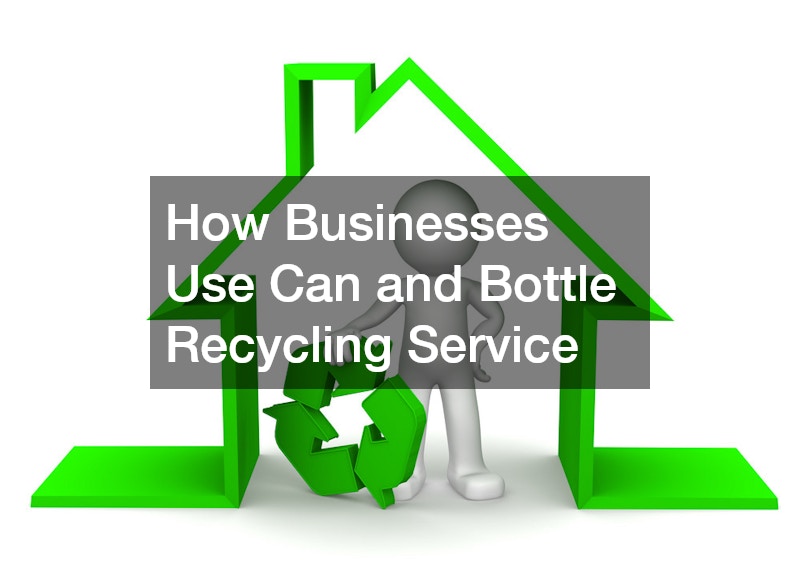Recycling has become an essential part of modern business operations, not just for environmental reasons but also for financial and reputational benefits. Many organisations are recognising that sustainable practices, such as implementing can and bottle recycling services, can enhance their brand image, reduce operational costs and foster a positive workplace culture. By integrating these recycling services into everyday business activities, companies are contributing to a circular economy that benefits both the community and the environment.
These programs allow businesses to efficiently divert waste from landfills while generating opportunities for financial returns through deposits or bulk recycling schemes. The adoption of such services demonstrates a commitment to sustainability that resonates with employees, clients and the wider public.
Benefits of Can and Bottle Recycling for Businesses
Implementing a recycling program can provide a range of benefits beyond environmental impact. Businesses can lower waste disposal costs, meet regulatory requirements and align with broader sustainability goals. These advantages often translate into improved brand reputation, as consumers increasingly favour companies that actively reduce their environmental footprint.
Specifically, can and bottle recycling services offer tangible benefits such as reclaiming deposit refunds, reducing the volume of general waste and supporting corporate social responsibility initiatives. For small and medium enterprises, this can also mean simpler waste management and less reliance on external waste contractors, ultimately saving both time and money.
Implementing Recycling Programs in the Workplace
A successful recycling program begins with clear planning and effective communication. Businesses need to identify the types of materials that can be recycled, provide appropriate collection bins and ensure all staff understand the process. Training and signage are key components to ensure participation is consistent and effective.
For can and bottle recycling specifically, businesses often designate a central collection point where staff can deposit items. This is supplemented with scheduled pick-ups by recycling services to maintain a streamlined operation. Establishing routine checks and feedback systems helps maintain high compliance and ensures the program remains both practical and efficient for the workplace.
Reducing Waste Through Efficient Recycling Practices
Recycling alone does not guarantee waste reduction; efficiency in sorting, collection and disposal is equally important. Businesses that optimise these processes can significantly decrease their overall environmental impact while improving operational effectiveness. Properly managed programs prevent contamination, reduce landfill contributions and ensure recyclable materials are processed correctly.
By integrating recycling services into daily operations, businesses can maximise these efficiencies. For example, separating materials at source and educating staff on acceptable items ensures the program runs smoothly. In turn, this reduces unnecessary costs associated with incorrect disposal and enhances the overall sustainability of the company.
Engaging Staff in Recycling Initiatives
Employee involvement is critical to the success of any workplace recycling initiative. When staff understand the importance of recycling and see tangible outcomes, they are more likely to participate actively. Engagement can be encouraged through training sessions, internal campaigns and recognition programs that reward sustainable behaviours.
Businesses often find that promoting friendly competitions, such as who collects the most cans or bottles, boosts participation. Highlighting the environmental impact of their efforts can also create a sense of shared purpose. This engagement not only supports recycling goals but also strengthens workplace morale and a collective commitment to sustainability.
Measuring the Impact of Recycling on Sustainability
Tracking and reporting the outcomes of recycling initiatives helps businesses understand their impact and identify areas for improvement. Metrics might include the volume of cans and bottles recycled, cost savings achieved or the reduction in landfill contributions. Accurate reporting also provides transparency to stakeholders and supports environmental certifications or sustainability reporting.
With recycling services, businesses can monitor collection volumes and associated financial returns. Many service providers supply reports that quantify both environmental and economic benefits, making it easier for companies to evaluate success. These insights enable businesses to refine programs, demonstrate accountability and continually enhance their sustainability performance.
Incorporating recycling into business operations is no longer optional; it is a crucial component of responsible management and corporate citizenship. By adopting can and bottle recycling services, businesses can reduce waste, engage staff and support broader environmental goals. Beyond the practical benefits, these initiatives reflect a commitment to sustainable practices that resonate with employees, clients and the community.
Successful recycling programs require careful planning, consistent engagement and measurable outcomes. Businesses that prioritise these elements can achieve meaningful environmental impact while enhancing operational efficiency and strengthening their reputation. Sustainability becomes a shared value across the organisation, demonstrating that responsible practices and business success can go hand in hand.

